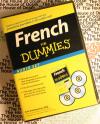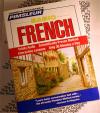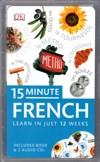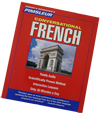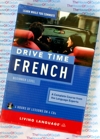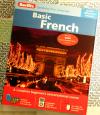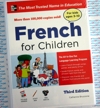French Phrasebook and Dictionary - Lonely Planet
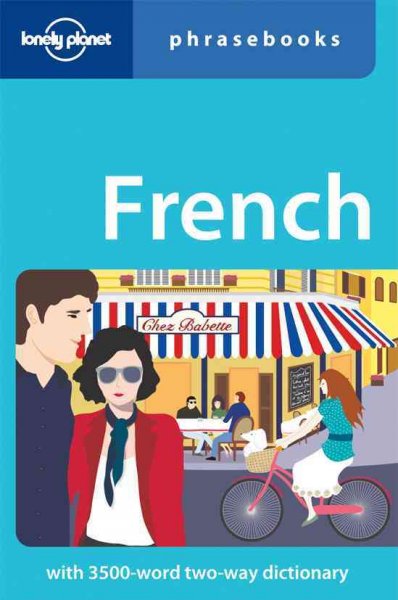
French Phrasebook and two way dictionary - Lonely Planet
Other French Audio and language learning click here
Paperback 258 pages 130 grams
Phrasebook in hand, bus ticket secured, you discover the bus driver shares your passion for ball games and brie. He invites you to meet his family over a game of pétanque and a long lunch. Enrich your travel experience with easy access to thousands of words and phrases.
Our phrasebooks give you a comprehensive mix of practical and social words and phrases in more than 120 languages. Chat with the locals and discover their culture - a guaranteed way to enrich your travel experienc
About the French Language
French is regarded as the northerly associated with the ROMANCE LANGUAGES that descend from Latin, the french language associated with the Roman Empire. Historically simple fact is that language of northern France: it became France's national language, and wide spread to other sorts of parts of the world with French conquest and trade. The Celtic-speaking inhabitants of Gaul were the primary non-Italians for you to a full part inside of the culture of the Roman Empire. Not surprisingly, there can be Celtic loanwords in Latin as well as in each of the Romance languages. Usually there are some documents and religious texts in French belonging to the 10th and 11th centuries, even so the first real flowering of French literature is there to epics, the greatest being the Chanson de Roland `Song of Roland' of around 1200. The pair were recorded in manuscript form for oral recitation. Made by this beginning, French poetry soon be¬came more varied and many more consciously literary. Wedding and reception language of Paris and of the neighbouring royal monastery of Saint-Denis was already influential, medieval French texts have varied dialect links. This is exactly natural since Paris was not the only major centre of French cultural life. Following on from the Norman conquest in 1066, London was another: for nearly two centuries and after that date not English however, the key Anglo-Norman variety of French was the most common lan¬guage of literature in England (alongside Latin). The oldest and best manuscript of the Chanson de Roland is Anglo-Norman.
Currently being the connections between England and France grew more distant, Anglo-Norman -and not just developing to be able to new modern Ro¬mance language - regressed to a jargon of lawyers and courtiers. Its descendant, 'Law French', can nonetheless be found in fossilised phrases in modern English legal terminology. But English, now revived increasingly being a language of culture and literature, had taken in a mass of loanwords from French, involving most aspects of everyday life, often providing near-synonyms to Germanic words: thus while English still uses Germanic terms along the lines of ox, sheep, pig for those who are domesticated ani¬mals, it uses the French loanwords beef, mutton, pork (modern French boeuf 'ox', mouton 'sheep', pore 'pig') because of their meat. Meanwhile Paris was asserting its position in conjunction with the centre of French culture. The central role of French, the French of Paris, followed because of this. Two landmarks you will discover first step toward the Uni¬versity of Paris, chartered in 1231; the spread of printing, afterwards of the 15th century; along with the Ordonnance de Villers-Gotteret, 1539, which ruled that legal proceedings in France ought to be en langaige maternel francois, 'included in the French mother tongue'. In practice, this asserted the uniquely privileged status of French but not only against Latin as well as against OCCITAN, BRETON, BASQUE along with the local dialects or patois of French. Yet French does borrow from its regional languages: bijou 'jewel' is known as a Breton loanword, while bouillabaisse 'fish soup' is regarded as many food words borrowed from Occitan dialects.
As a result of 16th century, French was the language linked with an astonishingly rich literature - and writings in French were read, admired, translated and imitated across every bit of western Europe. Among the list of greatest of older classics ended up being the poetic Romance belonging to the Rose (adapted in English by Chau¬cer), the Arthurian romance sequence Lancelot (the main starting point for Malory's English Morte Darthure) as well as the vivid chronicles associated with the Hun¬dred Years War written - in French that has been influenced by his native Picard dialect - by Jean Froissart. The 16th century must have been a period of exciting and varied experiment, and as well a vast amount of linguistic borrowing from Latin and from Italian. A reaction followed, often identified because of the influence of Francois de Malherbe (1555-1628). Written French developed into a rule-bound language, with an artificially restricted vocabulary. Notwithstanding the Enlightenment as well as in spite belonging to the French Revolution and all sorts of which has had followed, generally in most ways written French remains to be rule-bound. Spelling and usage are overseen based on the Academie Francaise, a self-elected college of eminent authors and intellectuals, under govern¬ment patronage. Standard French differs rather widely from most people's everyday speech. Traditional French verse, which some still write, demands a special pronunciation (see box). For a lot of this, French remains the language of a very rich and flourishing literary culture, in a few ways in the most vital in Europe

 0 Items (Empty)
0 Items (Empty)
